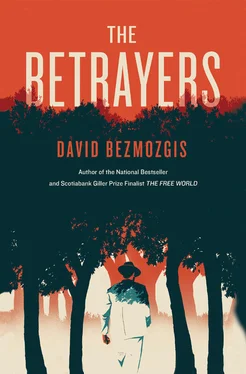Kotler and Leora drew up to the table, though Kotler hardly looked at the offerings. He came to rest near the boy, who continued the compulsive thing he was doing with his phone. The woman fanned herself with her hand, though Kotler and Leora were the ones under the sun.
— Good day, the woman said.
— Good day, Kotler answered abstractedly, his thoughts elsewhere.
— Visiting Crimea?
— Visiting.
— Where from? she asked.
— Israel, Kotler answered plainly, since there was no longer any reason to dissemble.
— Ah, Israel, the woman said, investing the word with a completely arbitrary meaning.
A simple mercantile woman, without politics, Kotler thought. But that was all the consideration he was willing to give her. He asked Leora to borrow her phone — What for? she asked — Penance, he said — and took several steps away from the table. Only tangentially did he hear Leora’s exchange with the woman.
— Yalta onions. Sweet as sugar. Taste.
— I believe you.
— Tell me, what do you know about honey?
— What everyone knows.
Kotler stood by the roadside. A truck plunged through the amplitude of dense air, and a wave of it washed over and staggered him. He had tried to do right, he thought, but had caused a great deal of hurt, even more than he’d expected. In some future of books and historians, he might yet be exonerated, but in the present he could not point to a single positive outcome. From the entire mess he would have liked to salvage at least one. There still remained a possibility, and in three or four phone calls he would know if it was feasible. He placed the first call to his office, for the number of a man he trusted at the JDC in Jerusalem. From this man he received the address of the Simferopol Hesed, a phone number, and the name of its director, Nina Semonovna Shreibman. He made his last call to her.
By noon they arrived at the Hesed. The driver, though he claimed to know the city, had trouble locating the building.
— What kind of place is it? he asked.
— A Jewish center.
— They don’t make it easy to find.
— Not by accident, Kotler said.
In the parking lot the driver took a space under the branches of a juniper tree. The sun was high overhead and the air smelled thickly of the surroundings, of the tar in the asphalt, the metal and rubber of automobiles, the molten pitch of the trees.
— Keep track of your time, Kotler said to the driver. I don’t know how long we’ll be. I hope not long.
— So long as you pay, it’s all the same to me, the driver said, lowered his window and reached for his newspaper. Reconciled to waiting by vocation and heredity. A stern relentless life, Kotler thought. Thus they’d sat in the trenches as the Panzers advanced.
At the door to the Hesed, Kotler pressed the buzzer, and the door clicked open to admit them. A man was seated behind a desk in the vestibule. He looked to be in his fifties, with a long melancholic face and graying hair. He regarded Kotler and Leora with no special interest.
— We’re here to see Nina Semonovna.
— And you are?
— Baruch Kotler.
— One minute, the man said, Kotler’s name evoking no more recognition than had his face.
There was a telephone on his desk. The man lifted the receiver and dialed a number.
Kotler and Leora stood by. Kotler looked wryly at Leora as if to say: And we feared I’d be recognized …
A short exchange, and the guard hung up the phone.
— Go through, he said.
They went past the desk and into the narrow corridor, built along the Soviet administrative plan. In such corridors he had queued up for every piece of paper in his Soviet life, including, once upon a time, his exit visa. But here, instead, he saw a large wall map of Israel adorned with crayon drawings of camels, pomegranates, and menorahs. Beside it were the photographs of decorated Russian Jewish war veterans. This arrangement was also familiar. There had been a time when, in his capacity as an Israeli minister and an emancipated prisoner of conscience, he had visited many Jewish centers across the former Soviet Union. He’d done more of it in the years immediately after the Soviet Union’s collapse, when he still possessed considerable stature and mystique. Back then it would have been unfathomable for a guard, for even a charwoman, to have failed to recognize him in the most far-flung Hesed. He had made those trips, his triumphant return, accompanied by reporters and photographers, and he’d posed and reminisced and delivered the same message to all of the Jews who’d come to lay eyes on him and clasp his hand: Brothers and sisters, come home! Come to Israel! And they had come. He didn’t flatter himself that it was because of his personal invitation. The main credit went to Yeltsin and Kuchma and Lukashenko for providing such excellent reasons to leave. But it wasn’t grandiosity for him to think he’d played a part. Even his worst enemies wouldn’t quibble with that. He’d played a part and seen the results. Now here he was, doing what? Escaping those results? And what’s more, taking the opposite line: telling a Jew to stay rather than go.
Not knowing which office was Nina Semonovna’s, they walked the length of the corridor looking into the rooms. They saw the library — several shelves partially covered with books watched over by a woman who smiled meekly at them from behind a counter. Next, a nursery from which they could hear voices. Kotler saw three small children not yet able to walk and two others who were older. Various toys and games were scattered about the room. A young woman minded the littlest ones while a young man helped the older ones make cardboard shields emblazoned with drawings of intricate and colorful birds.
As they made their way along the corridor, Kotler noticed that they were being watched. A man, older than Kotler, stood at the double doors of one of the rooms and marked their progress. From a distance Kotler couldn’t read the man’s disposition. Nobody would have described him as menacing. He was a bald, slightly stooped, elderly Jew. Bifocals hung from a lanyard around his neck. But his expression, when they neared, was cagey.
— Good day, he said to Kotler, still inspecting him.
— Good day, Kotler replied.
— Have I seen you here before? the man asked.
— I’ve never been here before, Kotler said.
— You looked to me familiar, the man said.
— I have that kind of face.
— But you’re Jewish?
— A popular question in Crimea.
This evasion the man disregarded, since his interest was in establishing the fact.
— But are you?
— I am, Kotler confirmed.
— Redstu Yiddish? the man inquired.
— A bissel, Kotler replied, to the man’s great delight.
— Ah, zeyer gut! Vos macht a yid?
— A yid dreitzikh, Kotler said. A Jew gets by, his father’s favored phrase.
— Come, the man said and indicated the room to his right. You must join us.
Kotler glanced inside. There was a proscenium at one end, an upright piano, and much empty floor space. In the middle of the room, a card table held a chessboard over which two men were bent. Three others sat near them but paid scant attention to the game. One gazed out at Kotler while the other two commiserated together in the language of commiseration.
— It is our Yiddish circle, the man announced. We meet every Sunday to talk in Yiddish.
— What you heard, I’m afraid, is the extent of my Yiddish. I’d be of no use to you.
— What about chess? We also play chess.
— My chess is worse than my Yiddish, Kotler said.
— No Yiddish and no chess? the man chided. What kind of Jew are you?
Читать дальше












